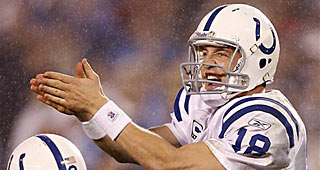Athletes and actors often lend their names to products when their careers have taken a severe, and sudden, downturn. We?ve seen William Shatner pump PriceLine.com as though life depended on it, and Wilford Brimley support the ?Beetis as if the very serious disease was cutting him more checks than he could cash.
What we?ve seen more of in recent years are ?it? stars showing their public support or maybe just lending their ?name,? to a multitude of products. It?s all just a part of our Capitalist, commercial society, but it?s something many star-struck citizens gobble up faster than Thanksgiving turkey.
No one embodies this more than Colts? quarterback Peyton Manning, who has pitched more things over the last two years than the Twins? Johan Santana.
It?s unbelievably hard to watch television, especially on a Sunday, and not catch at least a few dozen of Manning?s advertisements. As great of a quarterback as he is, a majority of Americans know him more for his commercials than his Super Bowl victory and single-season touchdown record.
Manning has unthinkably become the most marketable athlete on the planet without freakish speed or a beautiful GQ smile.
Even before a basement full of dogs took a bite out of his career, Michael Vick had already been surpassed by Manning in terms of marketability. Vick?s urban appeal and lightning-fast legs couldn?t hold a candle to Manning?s self-deprecating and dry sense of humor.
What?s even more amazing is how small of a market Peyton essentially represents. Indianapolis remains one of the NFL?s smallest markets, but we still found Peyton?s face in no less than eight national television ads last season.
That?s more than Yankees? shortstop Derek Jeter and Lakers? guard Kobe Bryant combined.
According to Sports Illustrated, Manning collected $11.5 million in endorsement cash last season with that likely to rise this season due to the Super Bowl ring on his finger.
His 30-second spots have become so popular that Sprint vice president of marketing Steve Gaffney expects that the commercial featuring Peyton in a pseudo-mustache commenting on his ?rocket-laser arm? will soon be immortalized in a t-shirt. You know a commercial has really struck gold when people start donning catch phrases across their chests.
Patriots? QB Tom Brady may have Hollywood good looks and more beautiful women than most men could ever dream of, but he still can?t sell a product like Manning. His advertising commitments remain relatively minimal, with a few model-like cologne ads appearing here and there in world-wide publications.
However, the gap between Manning and his greatest competitor, on the field and in the commercial game, is somewhat smaller than it seems. Brady pulled in nearly $9 million last year in advertising revenue alone, just a few million shy of the Colts? field general.
According to a study conducted by E-Poll Market Research that was obtained by Keith Reed of the Boston Globe, 46 percent of adults recognize Manning by name and 31 percent by face, compared with 27 percent name recognition and 26 percent face recognition for Brady. That?s pretty remarkable when you consider both are famous for playing a sport in which 90 percent of their faces are covered on the field of play.
Brady?s commercial demand stems more from his Hollywood appeal than personality or wit. His relationship with Bridget Moynahan, which produced a son this year, and his current girlfriend model Gisele Bundchen has added infinitely to his Q Score (which marketing evaluators use to value celebrities).
What separates Manning from Brady slightly is that he doesn?t turn down local offers, which Brady seems to leave for the Patriots? lesser-known stars. Peyton has been featured in advertisements for car dealerships in-and-around the Indianapolis area, perhaps to pay homage to the Colts? immediate fan-base.
In terms of dollars and cents, it?s hard to determine what Manning actually means to the companies he represents.
?It depends on how much it costs to have Manning endorse a product/brand, and what profit outcomes are attained with his endorsement,? said Shailendra Pratap Jain, a marketing professor at Indiana University?s Kelley School of Business. ?It is very hard to predict with accuracy what profit the firm will make if Manning or any other celebrity was to be an endorser. Celebrities attract attention and can create strong recall. But at times, recall of the celebrities ends up being higher than the product/brand they endorse,? added the notable professor.
Therefore, in actuality Manning might be benefiting even more than the companies he represents. That would explain why his appearances have snowballed since he began appearing in national spots a few years ago. Whether he?s pitching products for MasterCard, NFL Sunday Ticket, NFL.com, ESPN, Xbox, Sprint, Reebok or Gatorade, the act is basically the same.
Peyton either plays the role of the self-deprecating ?average? dude or the sarcastic self-help mentor.
Although it seems to have come effortlessly to Peyton, it?s not easy to keep your face plastered across the commercial landscape.
Just ask the man himself.
?Look, unless you?re under the age of 23, or a professional football player, it?s probably not going to happen.?
Does Peyton appear in too many commercials? Andrew.Perna@RealGM.com
RealGM Special: Looking At Peyton The Endorser


